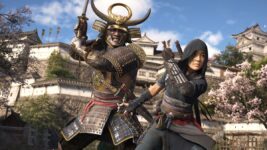Assassin’s Creed Shadows is one of the most anticipated games of the year, but it’s also been controversial among some groups of gamers due to its inclusion of Yasuke, a Black samurai. In today’s surprise announcement of an Assassin’s Creed Shadows delay, Ubisoft CEO Yves Guillemot addressed those “polarized comments,” as he put it, saying Ubisoft’s games are not meant to reflect any specific agenda.
“I want to reaffirm that we are an entertainment-first company, creating games for the broadest possible audience, and our goal is not to push any specific agenda,” Guillemot said in today’s financial update. “We remain committed to creating games for fans and players that everyone can enjoy.”
It’s quite a change in tone from Guillemot’s words in June, when he called out “malicious and personal online attacks” directed at Ubisoft employees at partners.
“I want to make it clear that we, at Ubisoft, condemn these hateful acts in the strongest possible terms, and I encourage the rest of the industry and players to denounce them, too,” Guillemot said at the time. “I am proud to support the amazing work of our teams and partners, and I will always trust in their creative choices.”
By contrast, today’s statement is unhelpful at best and frankly I think it borders on outright cowardice. The backlash against Assassin’s Creed Shadows has been fierce but also emerges from a very narrow slice of the gaming community, a group that is very agenda-driven: It makes zero justifiable sense that traveling through the magic of the Animus to waste the Pope or do a solid for George Washington is normal videogame business, yet a Black samurai—based on a historical figure, like so many others in the series—is beyond the pale. There’s no mollifying this disingenuous crowd with hollow statements that it’s fun and games, and we should all just get along.
The most vocal contingent of Yasuke critics want nothing less than the outright removal of the character from the game, to be replaced with an “authentic” Japanese character. It’s absolutely bananas, and anyone who thinks they can make that group happy with this sort of anodyne nonsense simply needs to take a look at the responses to the delay announcement on X to be quickly dissuaded of such notions.
This isn’t Ubisoft first attempt at soothing the perennially aggrieved to poor effect. In July it issued a statement that Assassin’s Creed Shadows is not meant to be a “factual representation of history, or historical characters,” and that “while Yasuke is depicted as a samurai in Assassin’s Creed Shadows, we acknowledge that this is a matter of debate and discussion.” As we noted at the time, the new Assassin’s Creed has faced some legitimate criticism, but the defense of Yasuke is entirely unnecessary—and worse, it served to embolden the reactionary contingent of gamers who think diversity, equity, and inclusion efforts are somehow ruining games.
Assassin’s Creed Shadows executive producer Marc-Alexis Côté did better in June when he called out X owner Elon Musk for “feeding hatred” about the game. Côté also, wisely, did not respond to Musk’s tweet about Assassin’s Creed Shadows, saying, “By attacking someone like Elon… I will not convince people about our point of view as a team.”
I can’t speak from the perspective of a videogame executive but to my mind, that’s the approach that works. Ubisoft is never going to satisfy its worst, most bad-fatih critics and it shouldn’t waste time trying: The effort would be far better spent drawing clear lines on where it stands, even if it’s on a point as simple as “racist bullshit will not be tolerated.” It’s certainly doable: Bethesda Softworks made a point of embracing the anti-Nazi politics in Wolfenstein 2: The New Colossus, saying, “This is what our game is about.”
Alas, Ubisoft doesn’t have a great history on that sort of thing. Executives of the company that gave us The Division (anonymous agents of a previously secret Homeland Security unit respond to a devastating pandemic in New York City by killing truckloads of civilians), Ghost Recon Wildlands (American hit team infiltrates Third World nation to topple the government), and Far Cry 5 (Christian fundamentalist cult takes over a slice of backwater Montana and only heavily-armed locals can stop them) have insisted multiple times over the years that their games are not political—and if they are, they’re politically neutral. In that light, Guillemot’s statement is really just more of the same, and will have roughly the same impact—that is, none at all.




